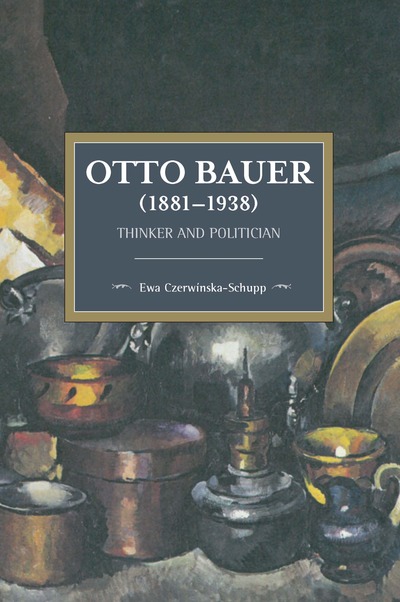Ewa Czerwińska-Schupp, Adam Mickiewicz University
This work depicts Otto Bauer as the main politician of the SDAP and attempts a critical-analytical interpretation of his socio-political theories, which are shown against the background of the debates within the First and Second Internationals, political events within the SDAP, the international workers’ movement, and the socio-historical processes in Austria and Europe at the time. The book emphasises Bauer’s analyses, philosophical and historiosophical arguments, his theories of imperialism and the national question, his deliberations on possible ways to socialism, the war question, and fascism, as well as his political activity. Otto Bauer (1881-1938) is also a treatise of the ideological, intellectual, cultural and political movement shaped by Bauer: Austromarxism.
First published in German by Peter Lang as Otto Bauer: Studien zur social-politischen Philosophie, Frankfurt, 2005.
Biographical note
Ewa Czerwińska-Schupp is a senior lecturer of philosophy at Poznan University. Her scientific research focuses on the social and political philosophy of the 20th century and the history of Marxism. She has published various treatises on Austromarxism, including Otto Bauer. Studien zur sozialpolitischen Philosophie (Peter Lang, 2015).
Readership
For philosophers, sociologists, politologists and historians – and anybody interested in the intellectual history of Europe, the political history of the Danube monarchy and First Republic of Austria, and the theory and practice of the workers‘ movement in 20th century Europe.
Table of contents
List of Figures
Introduction to the English Edition
Preface by Prof. Norbert Leser
Acknowledgements
1. Otto Bauer and His Time
2. The Materialist View of History
2.1. Scientistic Marxism
2.2. Historiosophical Reflections
2.3. Marxism and Ethics
3. A Contribution to the Theory of Imperialism
3.1. Imperialism as a Necessary Stage of Capitalism
3.2. The Socio-Political Context of Bauer’s Observations on Imperialism
3.3. The Question of Crises in the Capitalist Economy
3.3.1. Conjunctural crisis and the theory of overcoming crises
3.3.2. Structural crisis and ways of overcoming it
3.3.3. Rationalisation crisis
3.4. Socialism and the Theory of ‘Organised Capitalism’
4. The National Question
4.1. The Nation and National Culture
4.1.1. The essence of the national character
4.1.2. The peculiar quality of national consciousness
4.1.3. Thinking in the categories of national values
4.1.4. Cultural and natural community
4.1.5. The determinants of modern nation-forming
4.1.6. The nation as a real community of culture in a future state
4.2. The Nationalities Question in the Austro-Hungarian Monarchy
4.2.1. Social Democracy and the national question
4.2.2. Bauer’s position to the so-called nationalities question
4.2.2.1. Position on national conflicts
4.2.2.2. The programme of national-cultural autonomy
4.2.2.3. Remarks on national assimilation
4.2.3. The programme of the left and the demise of the monarchy
5. The ‘Third Way’ to Socialism
5.1. The Vision of Peaceful Revolution and Its Implementation
5.1.1. Parliamentarism and the revolution
5.1.2. Practice in the service of theory
5.2. The Theory of Social Upheaval During the Post-Revolutionary Period
5.2.1. The Programme of Linz
5.2.2. ‘Integral Socialism’
5.3. The Question of Revolutionary Allies for the Working Class
5.3.1. The socialisation programme
5.3.2. The agrarian programme
5.4. The Gradual Development of Attitudes to Revolution and Bolshevik Practice
5.4.1. The doctrinaire perspective: Chances of socialist revolution in Russia
5.4.2. A doctrinaire-pragmatic perspective: The New Economic Policy
5.4.3. A pragmatic perspective: Stalinism
6. State, Democracy, Socialism
6.1. The State as ‘Balance’ of Class Power
6.2. Parliamentary and Social Democracy
6.3. Democratic Socialism
6.4. Coalition Work
7. The War Question in Bauer’s Thought in Light of SDAP and LSI Policies
7.1. The SDAP Position until the Outbreak of World War I
7.2. Bauer’s Opposition to the SDAP Position on World War I
7.3. Bauer on a Future Armed World Conflict: Fears, Hopes, and Plans
8. The Spectre of Fascism
8.1. Harbingers of Fascism
8.2. Bauer’s Theory of Fascism
8.2.1. Fascism theory based on the notion of Bonapartism
8.2.2. Austrofascism as a special sub-variety of fascism
8.2.3. The theory of fascism as imperialism
8.3. The Anti-Fascist Uprising of Austrian Workers
8.4. Austrian Social Democracy and the Triumph of Fascism
8.4.1. Austrian Social Democracy’s relationship to strategic and tactical concepts of the workers’ movement during the period of fascist reaction
8.4.2. Oppositional activity of the Social-Democratic movement at home and in exile after the SDAP ban
Closing remarks
References
Index


